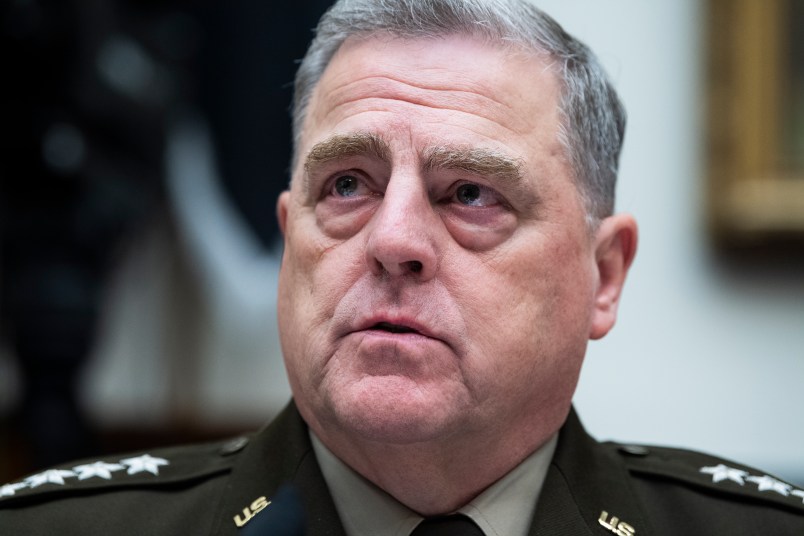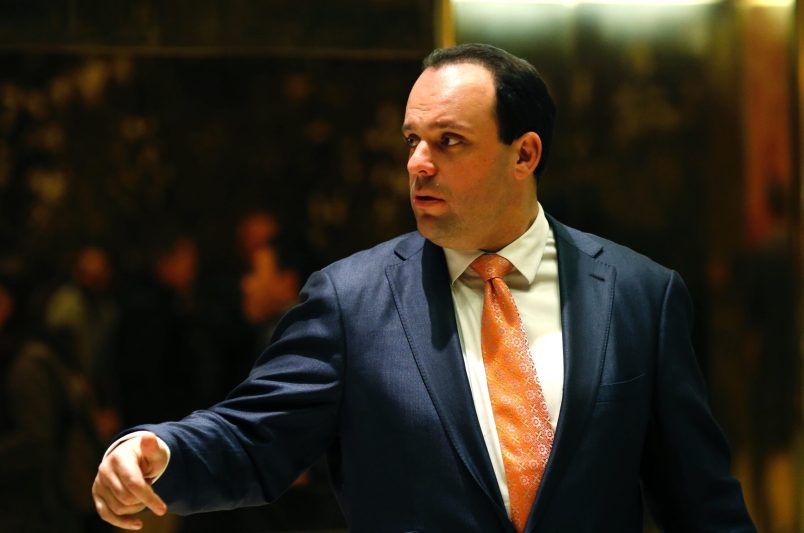In seeing the day two commentary on Joint Chiefs Chair Mark Milley’s actions in the final weeks of the Trump administration I’m more inclined to praise than to criticize him.
Josh Kovensky spoke to a number of experts who say Milley eroded civilian control of the military with his actions. In the abstract they have a good argument. Indeed, in every sense they have a good argument. The top uniformed officers in the military should not be taking it on themselves to second guess or derail the decision-making of their civilian superiors – especially the lawful commander-in-chief of the armed forces. Indeed, Alex Vindman, one of the heroes of the first Trump impeachment, said Milley should resign if the reports are accurate. But these moments are not in the abstract. They were in the midst of a unique and historic crisis in the stability of the American republic.
It is important to remember that at the time there was no Senate-confirmed Secretary of Defense. In substantive ways the legitimate chain of command had already been eroded or broken. The ability of a renegade President to reach down into command structure of the military and issue an illegitimate order was much higher than it normally would be. At the time the President was already involved in a slow motion coup and them a kinetic attempt to overthrow the republic using an armed mob of his supporters.
My overall take on this news is that Milley seems to have acted honorably and judiciously given the extreme circumstances in which he was operating. But there are two additional points that I think clarify how we should see these historic events and irregular decisions.
The first is that this is a very good example of why we need the current special investigation. I don’t know just what is in the book. But my understanding at least is that Milley was acting on intelligence which suggested China believed we might be about to launch a military attack. Just what did that intelligence say and how credible was it? We can’t evaluate Milley’s actions without knowing more about that.
The other point is that Milley appeared to be acting on the belief that Trump was dangerously unstable and capable of committing grave crimes either out of spite or in an effort to retain his hold on power. Those of us who are Trump’s critics probably have little difficulty believing that. But Milley is no Never Trumper. Indeed, at the time of his appointment reporting suggested that he had more effectively ingratiated himself with Trump than his top rival. So we need to know just what information he was operating on. What had he seen? What had he been told? Again, we can’t evaluate his actions without those details. There’s a very good chance those details are much worse than we anticipate.
In short, we can’t evaluate Milley’s actions which are certainly highly irregular without a searching investigation of the events of the winter of 2020-21. It’s almost comical to think we can do so without one.
The other point takes us far back into the deepest reaches of the American republic. Thomas Jefferson ascended to the presidency in 1801 with a belief in a highly circumscribed role for federal power. He then proceeded to use federal power in one of the most far-reaching and audacious moves then imaginable when he bought a big chunk of North America from Napoleonic France and added it to the United States.
Some years later Jefferson was discussing with a correspondent how he justified this action. I discussed this in a post from 2004.
Jefferson’s argument, however, wasn’t that the president had the prerogative to set aside the law. It was that the president might find himself in a position of extremity in which there was simply no time to canvass the people or a situation in which there was no practicable way to bring the relevant information before them. In such a case the president might have an extra-constitutional right (if there can be such a thing) or even an obligation to act in what he understands to be the best interests of the Republic.
The clearest instance of this would be a case where the president faced a choice between letting the Republic be destroyed or violating one of its laws.
But that wasn’t the end of his point. Having taken such a step, it would then be the obligation of the president to throw himself on the mercy of the public, letting them know the full scope of the facts and circumstances he had faced and leave it to them — or rather their representatives or the courts — to impeach him or indict those who had taken it upon themselves to act outside the law.
As I recall Jefferson’s argument there was never any thought that the president had the power to prevent future prosecutions of himself or those acting at his behest. Indeed, such a follow-on claim would explode whatever sense there is in Jefferson’s argument.
If you see the logic of Jefferson’s argument it is not that the president is above the law or that he can set aside laws, it is that the president may have a moral authority or obligation to break the law in the interests of the Republic itself — subject to submitting himself for punishment for breaking its laws, even in its own defense. Jefferson’s argument was very much one of executive self-sacrifice rather than prerogative.
Though he has been taken down several notches in esteem in recent years I still think Jefferson tends to be overrated compared to many other members of the founding generation. But here I think he wrotewith great clarity and civic-moral insight. It’s an insight highly relevant to the Milley case. As I said, we don’t really know even what Milley did, let alone which facts or justifications were before him when he acted. But extraordinary situations can require a person in authority to act outside the normal bounds of law and propriety. The key is that you have to level with the people about what you did and why you did it. And you have to accept their judgment. This is the critical second part of the equation which supporters of a vastly powerful presidency habitually leave out. And the principle applies to a Joint Chiefs chair as much as it does to a President.
Based on what we know I think Milley was operating within his oath. But let’s find out the details. It’s important not only for evaluating Milley’s actions. But it also will force us to contend with the unfinished business of Trump’s attempted coup which too many of us are trying to sweep under the rug.








